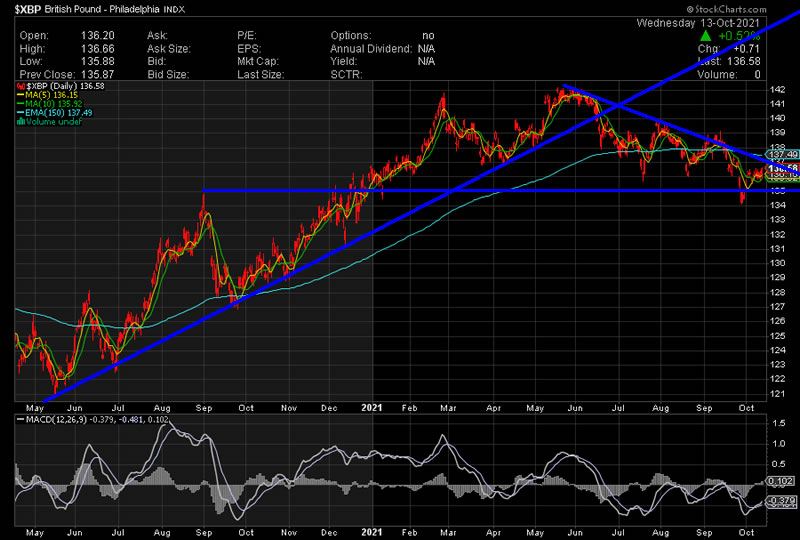Ailing UK Pound Has Global Effects
Currencies / British Pound Oct 14, 2021 - 05:24 AM GMTBy: Justin_Weinger
Are you among the millions of financial news watchers who wonder what is going on with the British pound (GBP)? If so, you've probably already noticed that one of the big four currencies has been dropping in recent months. Not since the first few weeks after the Brexit deal took effect has the UK's denominated currency been hit so hard. Its most recent value in terms of US dollars (USD) was $1.357, but what's worrying most traders is the GBP's volatility, which also stands are recent highs. There's no question that the pound is taking a pounding, but two questions are uppermost in the minds of forex enthusiasts:
- How will FX markets react to this recent development?
- What kinds of opportunities does the pound's woes offer to foreign exchange traders?
It's important to remember that whether a currency rises or falls in relative value, compared to another, active investors and forex watchers can earn a profit if they correctly predict price changes. For example, it's possible to use a simple forex profit calculator to determine the likely gain or loss on a given position even before placing an order. So, how will the markets react, how can new and experienced traders take advantage of the situation, and why is the UK's economy in so much trouble to begin with? Here are more details about all those interrelated questions.
How Will the Forex Markets React?
As GBP's fall continues, and volatility remains high, those who regularly participate in the FX markets can react in a number of ways. First, optimists will assume that a bottom has been hit and that now is an ideal time to place buy orders, or go long UK's currency. The second reaction, if bad news continues, could be widespread betting on more declines. In foreign exchange, that means participants would place sell orders, hoping to cash in if the pessimists are correct. Overall, because GBP is one of the four majors, one thing is nearly certain in that there will be much more interest in the UK's denominated money, by both camps of prognosticators.
Trading Opportunities from Bad News
How do foreign exchange investors and trading enthusiasts view bad news? Generally speaking, the worse the news, the better the opportunities for profit. That's because, compared to traditional securities exchanges like those for stock shares, bonds, and commodities, it's simple to short a currency just by placing a sell order. Today's down in the dumps FX monetary unit happens to be the British-pound. Next month it might be something else. Regardless of who's on the ailing economy list, traders see opportunity in verifiable bad news, especially when the development is fresh and there appears to be more trouble ahead. To get in on the action, placing one or more sell orders, with carefully set stops and limits, can yield significant profits.
Calculating Possible Outcomes
For people who like to precisely figure out all possible outcomes of a trade, using a profit calculator is the way to go. Most of the better brokerage platforms offer built-in calculators that let you enter basic order information like price, the FX pair in question, an upper limit on profit taking, and a stop-loss on potential price declines. From there, the bot does the number crunching and displays the exact amount of upside and downside on every entered order and position you take. That way, there's no guessing on how much you stand to earn or lose. Experienced trading practitioners routinely use these types of applications to budget their capital accounts, manage losses, and track gains.
Watching the Big 4
All over the world, billions of FX transactions take place every day. However, the four most traded currencies are the U.S. dollar, the European Union's euro, Japan's yen, and the British pound, (USD, EUR, JPY, GBP). The big four, as they're known to FX insiders, are all having a volatile 2021. Again, it's nearly impossible to point to a single reason, but there have been a couple of unique events in each economy during the year.
The COVID pandemic is a common denominator in that it slowed down every major economic power due to widespread business shutdowns and heavy social restrictions on personal movement. The U.S. political administration changed from a conservative to liberal one, while Japan's prime minister chose to step down amid high unemployment and pandemic-related financial disasters. It's the same story in Europe as the nations with the most draconian lockdown policies and business restrictions began to suffer from advancing inflation and low employment numbers across the board.
By Justin Weinger
© 2021 Copyright Justin Weinger - All Rights Reserved Disclaimer: The above is a matter of opinion provided for general information purposes only and is not intended as investment advice. Information and analysis above are derived from sources and utilising methods believed to be reliable, but we cannot accept responsibility for any losses you may incur as a result of this analysis. Individuals should consult with their personal financial advisors.
© 2005-2022 http://www.MarketOracle.co.uk - The Market Oracle is a FREE Daily Financial Markets Analysis & Forecasting online publication.




